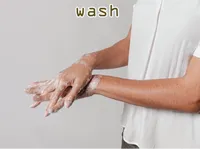
English vocabulary and phrases on Mid-Autumn Festival
wash means . Learn how to pronounce and use wash through vivid examples and easy-to-understand exercises.

Okay, let's break down how to pronounce "wash" in English! There are a few variations, but here's the most common and generally accepted pronunciation:
The most common pronunciation (American English):
/wɑʃ/ (rhymes with "cash")
A slightly more formal or British pronunciation:
/wɒʃ/ (rhymes with "box")
Here's a breakdown to help you:
To recap: Most English speakers will automatically use the /wɑʃ/ pronunciation. However, be aware of the /wɒʃ/ variation, especially if you're listening to British English.
Do you want me to:
Let's break down how to use the word "wash" in English. It's a surprisingly versatile word with several different meanings! Here's a breakdown, categorized for clarity:
To clean something by using water and soap or detergent:
Phrases using "wash":
Here’s a table to summarize:
| Form of “Wash” | Meaning | Example |
|---|---|---|
| Verb (common) | Clean with water and soap | “I’ll wash the dishes now.” |
| Verb (impersonal) | General cleaning action | “The car is being washed.” |
| Verb (specific) | Clean with a particular agent | “He washed the silver with polish.” |
| Noun | Cleaning fluid/detergent | “Dish wash” |
| Noun (rare) | A body of water | “A wash of spray” |
Resources for Further Learning:
To help me give you even more tailored advice, could you tell me:
Which of these actions helps maintain good personal hygiene? a) Brush your teeth b) Wash your hands c) Take a shower d) Eat a balanced meal
When preparing for a formal dinner, you should ______ the delicate crystal glasses carefully. a) inspect b) dry c) wash d) stack
After a long day of gardening, I need to ______ the mud off my boots. a) wipe b) scrub c) wash d) brush
Before cooking, it's essential to ______ fresh produce under running water to remove pesticides. a) peel b) rinse c) chop d) soak
To prevent the spread of germs in a clinical setting, it's crucial to ______ surfaces regularly. a) inspect b) disinfect c) clean d) sterilize
The company's new protocol requires employees to thoroughly sanitize their hands before entering the cleanroom. Rewrite the sentence using a form of "wash":
After the laboratory experiment, all glassware needed a meticulous cleaning. Rewrite the sentence using a form of "wash":
The heavy rain helped to wash away the debris from the construction site. Rewrite the sentence using a suitable replacement word instead of "wash" or its forms:
Exercise 1: Fill in the blanks
Exercise 2: Choose the correct answer
Exercise 3: Rewrite the sentences

English vocabulary and phrases on Mid-Autumn Festival

Tips to improve vocabulary in communication

English vocabulary by topic: Clothes

The secret to remembering all 50 English vocabulary words every day easily

English vocabulary by topic: Human body

Vocabulary of the most popular subjects in English

Learn English about Covid: All about vocabulary and disease prevention

Vocabulary of Subjects in English

Set of 60 English vocabulary on educational topics

Vocabulary - just a small thing!
Comment ()